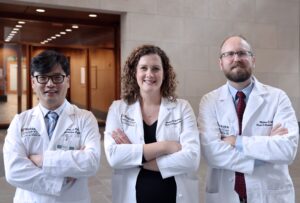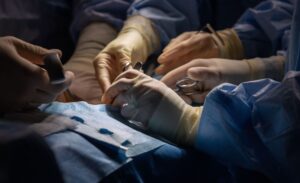Craniofacial Surgery
Head injury is one of the most common reasons for emergency room visits in the U.S. and a leading cause of craniofacial deformities in adults. In children, congenital conditions are the most common cause of face and skull differences. Whether acquired or congenital, craniofacial differences may greatly affect daily life, making speech, facial gestures and breathing difficult.
Overview
The most common causes of craniofacial differences include severe facial trauma, tumors and cysts, craniosynostosis, and cleft lip and palate. Treatment for these conditions often requires complex surgery as well as compassionate and understanding care. We offer a specialized, multidisciplinary team of experts who will work with you and your family to achieve results that can be life changing.
Facial Trauma
Blunt force trauma to the face and skull can cause complex fractures and impair muscle movement, vision, breathing, chewing, swallowing and nerve function. In some severe cases involving a significant loss of soft tissue, one of our specialists may use skin grafts and tissue transplants to reconstruct the affected areas. Surgery also may be used to correct and reshape bone structure, repair soft tissue and restore function in the face.
Jaw Tumors and Cysts
Tumors and cysts located on the jaw bones can cause changes to facial structure. While these growths usually are not cancerous, they can grow aggressively and should be removed as soon as possible. Left untreated, these conditions can quickly turn from minor nuisances to major differences that affect movement and function.
Cleft Lip and Palate
Cleft lip and cleft palate, called orofacial clefts when occurring together, are congenital, meaning they are present at birth. Because this condition results in an underdeveloped upper lip and mouth, it can cause difficulties with eating, breathing, swallowing and speech development. Infants born with this condition also are predisposed to hearing problems. Treatment usually involves surgeries throughout early childhood, as well as speech therapy and other developmental support.
Treatment for cleft lip and palate is usually complete by the time a child matures and transitions into adult health care. However, some people choose to have scar revision surgery as adults to improve the appearance of original surgery scars. People with this condition also may develop obstructive sleep apnea as adults.
Conditions & Treatments
Our nationally recognized surgeons are dedicated to focusing on your unique craniofacial surgery needs and the following conditions:
- Blemishes, moles, tumors, scars, keloids of the head and neck
- Cleft lip and palate
- Craniosynostosis
- Depressed skull and differences in head shape
- Ear anomalies
- Facial scar revision
- Fractures or injury to the face, jaw and orbit (old and new)
- Hemifacial Microsomia (Craniofacial microsomia)
- Malocclusion
- Nasal deformities
- Orthognathic (jaw) surgery
- Vascular or other complex malformations of the head, face and neck
- Wounds of the head and neck
Why Choose Us?
We offer world-renowned care for craniofacial conditions in adults and children. As the Midwest’s epicenter for craniofacial care, Barnes-Jewish Hospital and St. Louis Children’s Hospital offer specialists with the expertise to take on complex reconstructive surgeries following traumatic injury. Our commitment to collaboration with plastic surgeons, vascular surgeons, neurologists, oncologists and other specialists allows us to provide innovative treatment and compassionate care.
What to Expect
Once you request an appointment, our scheduling team will call you to schedule your initial consultation.
Craniofacial differences can cause significant physical and emotional difficulties for adults and children. We offer compassionate care to those who seek treatment by our team of specialists. Our craniofacial surgeons treat adults at Barnes-Jewish Hospital and Barnes-Jewish West County Hospital. They treat children at St. Louis Children’s Hospital, where care is provided through its Cleft Palate and Craniofacial Institute.


